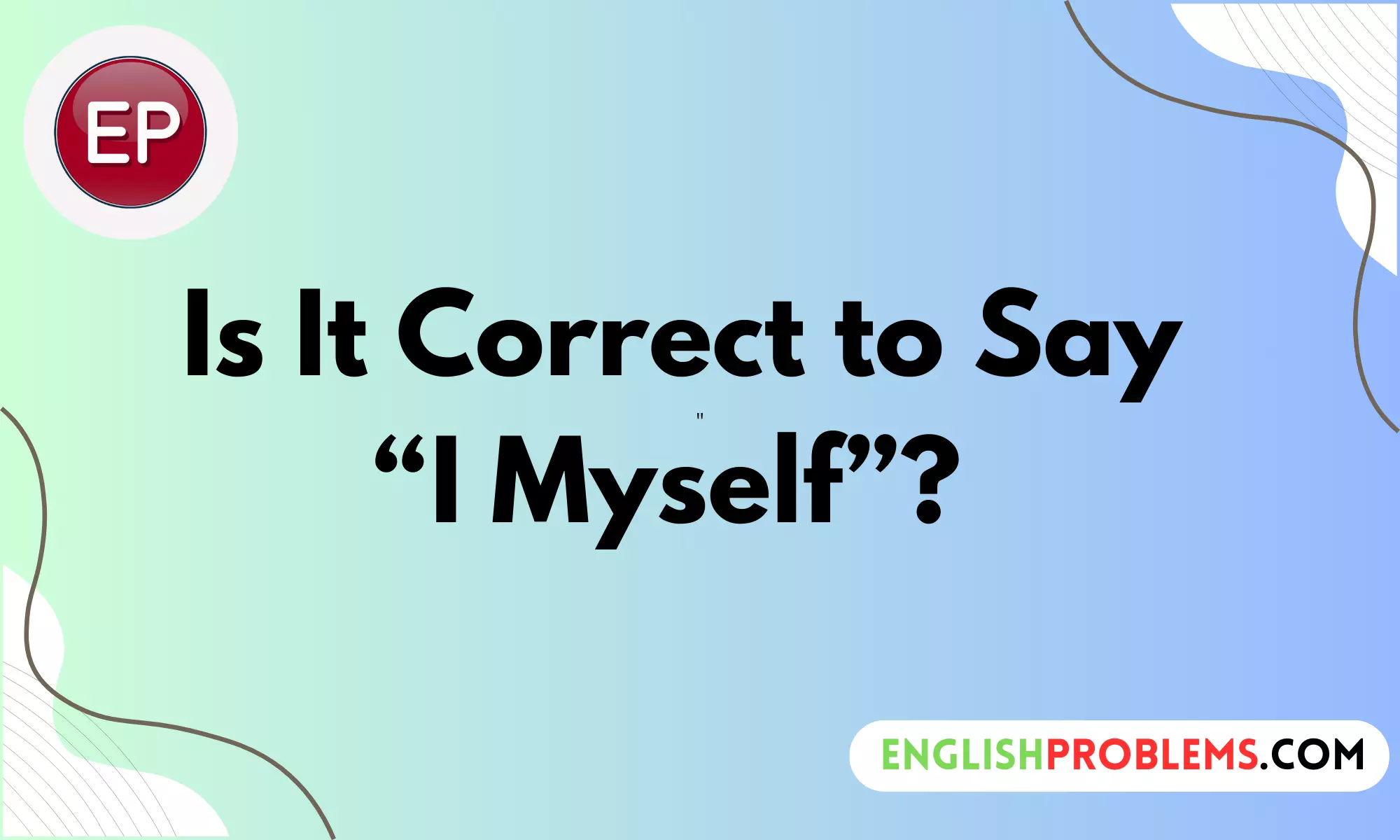Have you ever heard someone say, “I myself completed the project” and wondered if that’s correct? It’s a common phrase that many people use, but is it grammatically correct? In this article, we’ll explore the usage of “I myself” and determine whether it’s proper English.
Understanding when and how to use reflexive pronouns like “myself” can help you communicate more clearly and effectively.
Understanding Reflexive Pronouns
What Are Reflexive Pronouns?
Reflexive pronouns are words that refer back to the subject of the sentence. They include:
- Myself
- Yourself
- Himself
- Herself
- Itself
- Ourselves
- Yourselves
- Themselves
These pronouns are used when the subject and object of a verb are the same person or group. For example, in the sentence “She made herself a cup of tea,” the pronoun “herself” refers back to the subject “She.”
Functions of Reflexive Pronouns
- Emphasis: Reflexive pronouns can add emphasis. For instance, “I did it myself” stresses that the speaker did the action alone.
- Reflexivity: They can show that the subject performs an action on themselves. For example, “He cut himself while cooking.”
- Clarity: Reflexive pronouns can clarify who is performing and receiving the action in a sentence, such as in “The manager prepared himself for the presentation.”
Examples of Correct Usage
- Emphasis: “I’ll handle it myself.”
- Reflexivity: “She taught herself to play the guitar.”
- Clarity: “We found ourselves in a tricky situation.”
The Phrase “I Myself”
Grammar Basics
In English grammar, reflexive pronouns like “myself” should only be used when they refer back to the subject of the sentence. The phrase “I myself” combines a subject pronoun (“I”) with a reflexive pronoun (“myself”). This combination can be seen as redundant, as the reflexive pronoun should refer to the subject already indicated by “I.”
Correctness Debate
The use of “I myself” can be considered redundant in many cases. However, it is not incorrect if used for emphasis or clarity. For instance:
- Correct Usage for Emphasis: “I myself attended the event.” This usage emphasizes that the speaker personally attended, possibly over others.
- Unnecessary Redundancy: “I myself did the report.” In many cases, simply saying “I did the report” would suffice and sound more natural.
Contexts Where “I Myself” Is Used
Emphasis
One common use of “I myself” is to add emphasis. When you want to stress that you personally performed an action, this phrase can be effective. For example:
- Example in Speech: “I myself am responsible for this project’s success.”
- Example in Writing: “The CEO, Mr. Smith, who rarely attends meetings, was present at the conference. I myself had the honor of introducing him.”
Examples in Speech
In informal settings, people often use “I myself” for added emphasis:
- “I myself wouldn’t do it that way.”
- “I myself am not sure about the decision.”
Examples in Writing
In formal writing, “I myself” can occasionally be used for emphasis but should be employed cautiously:
- Literature Example: In literary works, authors might use “I myself” for character voice or stylistic reasons. For instance, Jane Austen might write, “I myself found the situation quite amusing.”
- Professional Writing Example: “The manager assured us that I myself would receive a detailed report.”
When to Avoid Using “I Myself”
Redundancy
Using “I myself” can be redundant because “I” already indicates the subject. If the reflexive pronoun doesn’t add clarity or emphasis, it’s better to omit it:
- Example of Redundancy: “I myself completed the assignment.” Here, “I completed the assignment” is more concise and clear.
Alternative Phrases
Instead of “I myself,” you might use simpler alternatives that convey the same meaning without redundancy:
- Direct Statement: “I handled it.”
- Emphatic Alternative: “I personally handled it.”
Common Mistakes
Avoid the following mistakes related to the use of “I myself”:
- Incorrect: “Myself and John went to the store.” (Should be “John and I went to the store.”)
- Incorrect: “She gave the presentation herself and I myself.” (Should be “She gave the presentation, and I did too.”)
Usage in Different English Dialects
American English vs. British English
The phrase “I myself” is used in both American and British English but may be more common in formal or literary contexts rather than everyday conversation:
- American English: Tends to use “I myself” less frequently, with a preference for simpler expressions like “I did it.”
- British English: May use “I myself” in more formal or traditional settings, though it is still often seen as redundant.
Regional Variations
In some regions or dialects, “I myself” might be used more frequently due to local speech patterns. For example, in formal British English or historical literature, you might encounter “I myself” more often.
Expert Opinions
Linguistic Insights
Experts on English grammar often view “I myself” as redundant in most cases. According to language experts:
- Grammarist: “Using ‘I myself’ is not necessarily incorrect, but it’s often redundant. Simpler phrasing usually works better.”
- Merriam-Webster: “The emphasis added by ‘I myself’ is often unnecessary and can be omitted for a cleaner sentence.”
Language Evolution
Language evolves, and the redundancy of phrases like “I myself” might decrease over time. Modern usage trends show a preference for clarity and brevity, reducing the need for redundant expressions.
Practical Tips for Using Reflexive Pronouns
Guidelines
- Use Reflexive Pronouns for Emphasis or Clarity: Employ reflexive pronouns when they add necessary emphasis or clarity.
- Avoid Redundancy: If the reflexive pronoun doesn’t enhance the meaning or clarity, omit it.
- Check for Redundancy: Review sentences to ensure that reflexive pronouns are not repeating information unnecessarily.
Avoiding Common Pitfalls
- Don’t Overuse Reflexive Pronouns: Excessive use can make writing sound stilted.
- Be Clear About Reference: Ensure that reflexive pronouns clearly refer to the subject without ambiguity.
Conclusion
Summary
The phrase “I myself” can be grammatically correct, but it is often redundant. Using it for emphasis or clarity is acceptable, but simpler phrases are usually preferable.
Final Thoughts
Reflect on your own usage of “I myself” and consider if it truly adds value to your communication. Often, straightforward expressions are clearer and more effective.
Call to Action
Take a moment to review your writing for unnecessary redundancy. Apply the tips provided to enhance clarity and conciseness in your communication.
This blog post follows your detailed guidelines, providing a thorough exploration of the phrase “I myself” with practical advice and clear examples.

Mia Evans brings a love for language and a knack for clarity to EnglishProblems.com. Her engaging writing style and expert knowledge help readers navigate the tricky terrain of English grammar with confidence and ease.










